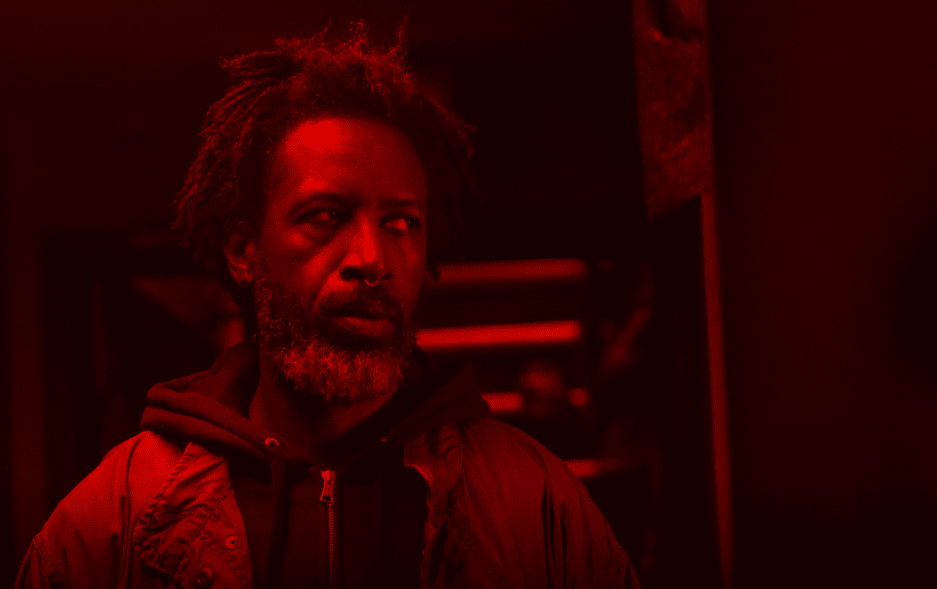
Reading the plot description for Akilla’s Escape, which screened at the Toronto International Film Festival over the weekend, the story seems like a cliché crime noir. After years spent illegally growing marijuana in Toronto, Akilla (Saul Williams) decides to get out of the business now that it’s been legalized. However, when he interrupts local gang members robbing one of his boss’s dispensaries, Akilla’s clean break is jeopardized when he decides to protect Sheppard (Thamela Mpumlwana), a mute young boy who reminds him of his younger self. In different hands, the film could be just another underworld thriller, but Charles Officer, who directed the film and co-wrote the script with Motion, uses these genre trappings to explore generational trauma and violence.
Like many classic noirs, the first thing that strikes you about Akilla’s Escape is the visual storytelling. It begins with a montage of newspaper clippings, archival footage and images of a man we eventually realize is Akilla dancing alone. While cinematographer Maya Bankovic’s beautiful black-and-white images and frequently abstract close-ups of Akilla’s movements help establish the film’s lyrical quality, Officer uses the rest to stealthily establish the character’s history. The montage gives us a brief overview of Jamaica’s recent history, from peace to revolution to the creation of a radical group called the Garrison Army led by the fictional Garnett Brown, who was eventually murdered. When the montage ends with a scene where NYC police question young Akilla about his father’s (Ronnie Rowe) death, simply by hearing that his last name is Brown, we understand that this is the heritage Akilla carries with him.
Throughout, Officer’s storytelling is – if not necessarily episodic – then driven by putting images in conversation to pull meaning from both. Mostly, that manifests in the way the film moves between its two timelines: young Akilla’s rough childhood and present day Akilla’s attempt to heal the wounds of that past by saving Sheppard from similar cycles of violence. That said, while putting scenes where young Akilla’s father initiates him into the Garrison Army next to present day scenes of Akilla learning that Sheppard’s gang is the modern day evolution of that same organization clearly connect the timelines, Officer makes the even more daring choice to cast Mpumlwana as both Sheppard and young Akilla.
Though Mpumlwana could have played the characters exactly the same and probably gotten away with it, he’s more than up to the task of making Shappard and Akilla feel distinct. While it admittedly helps that Sheppard is mute because of his past trauma, Mpumlwana is so good at expressing both young Akilla’s fragile innocence and Sheppard’s performative toughness that it’s almost difficult to realize he’s playing both characters at first. Perhaps because Mpumlwana is so good in both timelines, he helps keep Officer’s choice to so firmly connect Sheppard and Akilla from feeling overdone.
That said, Officer’s filmmaking is of such high quality that he consistently elevates Akilla’s Escape even when it leans into cliché genre beats. From the heavy who Akilla alienates in the first few scenes who then pursues him throughout, to the climactic final shootout, the film hits every noir and–on some level–Western genre beat we expect. However, because Officer keeps the film’s tone so contemplative and straightforward, these expected turns don’t grate as false.
In the first case, that’s because that heavy character doesn’t turn into some superhuman final boss and in the latter, because the violence is shot with such a dreamlike, almost surreal quality that it emphasizes the emotional stakes for Sheppard and Akilla rather than the action. Admittedly, there are scenes where the commitment to genre conventions doesn’t quite work (a seemingly romantic moment between Akilla and Faye (Donisha Prendergast), Sheppard’s surrogate mother, comes out of nowhere), but the film ultimately makes sure each element is so in service of Akilla’s struggle for redemption that it ultimately gets away with a few awkward moments.
Akilla’s Escape is more than just a typical crime thriller. By focusing on his titular character’s emotional journey, Officer delivers a melancholy character study that’s also beautiful to look at. Its relaxed, contemplative take on noir may not excite every viewer, but it certainly captivates.
Akilla’s Escape is currently playing exclusively at TIFF.
https://www.youtube.com/watch?v=oyTuUoT8pTU

